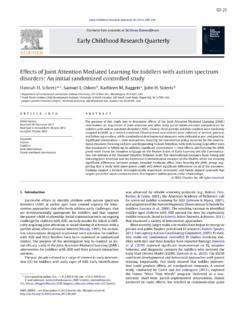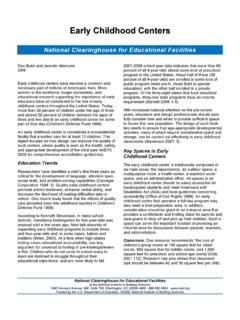Transcription of Nevada 2018
1 Nevada 2018 Nevada Early Intervention Services Nevada Department of Health and Human Services We see how early childhood experiences are so important to lifelong outcomes, How the early environment literally becomes embedded in the brain and changes its architecture . Dr. Andrew S. Garner, MD, PhD, University Hospitals of Cleveland (2013) WHAT IS EARLY INTERVENTION? Early intervention is a system of coordinated services and supports for eligible children from birth to three years of age with developmental delays or disabilities and their families. Early intervention promotes the child s growth and development and supports families in meeting the developmental needs of their child.
2 Early Intervention Services are mandated through Public Law 108-446, Part C of the Individuals with Disabilities Education Improvement Act of 2004 (IDEA). Nevada s Early Intervention system encourages family participation, ensures parents are fully informed and provide consent for all evaluations and services. From the determination of eligibility until children transition at age three, Nevada programs strive to support families through family-centered and family-friendly practices. WHAT ARE THE BENEFITS OF EARLY INTERVENTION? Over the years, researchers have discovered a variety of ways children learn and develop, as well as the importance of early intervention.
3 Scientific studies have documented what occurs in the brain during a child s first years of life, and can now predict what can give a child the best chance of success, thereby improving quality of life, including: A child s brain develops faster during the critical years from birth to three than at any other time and early intervention has a definite impact. Through early intervention, the long-term health of infants and toddlers with disabilities is improved, reducing the health costs of preventable secondary impairments and disabilities. Early intervention is known to decrease educational costs by minimizing the need for long-term special education and related services.
4 Early intervention is cost-effective because it enables families to provide care for their children within their home, reducing the need for costly institutional care while maximizing the child s potential for independence. Research shows that children with developmental delays are healthier and learn better when they receive services as early in their lives as possible. EARLY INTERVENTION SERVICES MAY INCLUDE ANY OF THE FOLLOWING: Assistive technology devices and services Audiology services Family training, counseling and home visits Health & Nutrition services Multi-disciplinary evaluations and assessments Occupational therapy Physical therapy Psychological services Service coordination Specialized Instruction Speech and language services Social work services Vision and mobility services Other Services, eg.
5 Transportation, Respite Care, etc. In most cases, by law all early intervention services must be provided in natural settings for children including the family home, child day care settings and other places in the community where typically developing children spend time. Read the Parent Handbook for more information at: Early Intervention Services in Nevada an early intervention program costing $6,730 per child generated a return on investment of $47,759 for each child. This means that for every $1 invested, $ was returned to society in the form of decreased expenditures. (When similar services for 2nd & 3rd graders were analyzed, results showed a return of only $ for every $1 invested.)
6 [AMA, 5/8/01, vol. 285, ] The brain grows at an amazing rate during development. At times during brain development, 250,000 neurons are added every minute! At birth, almost all the neurons that the brain will ever have are present. However, the brain continues to grow for a few years after birth. By the age of 2 years, the brain is about 80% of it s adult size. Neuroscience for Kids, University of Washington State Interagency Coordinating Council (ICC) Nevada ICC Members Ben Kieckhefer, Senator Nevada Legislature Representative Sherry Waugh, (ICC Co-Chair) Head Start Agency Representative, Early Head Start, UNR Lisa Cridland (ICC Co-Chair), ICC Parent Representative Southern Nevada Jason Adams, ICC Parent Representative Southern Nevada Vacant, ICC Parent Representative Southern Nevada Janina Easley, ICC Parent Representative Rural Nevada Christine Riggi, ICC Parent Representative Northern Nevada Aimee Hadleigh, ICC Parent Representative Northern Nevada Robin Kincaid, Advocacy Representative Nevada Yasodara Cabrera, Advocacy Representative Nevada Disability Advocacy & Law Center Sherry Manning, Advocacy Representative Governor s Council on Developmental Disabilities Karen Shaw, Native American Representative Washoe County School District Jenna Weglarz-Ward, , Personnel Preparation Rep.
7 , College of Education, Special Education, UNLV Ashley Greenwald, , UNR Nevada Center for Excellence in Developmental Disabilities, Rep. Keana Sullivan, Private Provider Representative Nevada Early Intervention-Nellis Child Development Yvonne Moore, Private Provider Representative Nevada Early Intervention-Positively Kids Sandra LaPalm, Public Provider Representative Nevada Early Intervention Services-Northeast Region Claribel Zecena, Public Provider Representative Nevada Early Intervention Services-Northwest Region Dawn Brooks, Public Provider Representative Nevada Early Intervention Services-Southern Region Vacant, Provision of, or Payment for, Early Intervention Services Rep.
8 , Aging & Disability Services Division Jack Zenteno, State Medicaid Representative Division of Health Care Financing and Policy Reesha Powell, State Foster Care Representative Division of Child and Family Services Vacant, Child Care Agency Representative Division of Welfare and Supportive Services Kimberly Everett, Health Insurance Agency Representative, State Division of Insurance Rhonda Lawrence, Early Childhood Mental Health Rep., Division of Child and Family Services Daina Loeffler, 619 Coordinator/Preschool Services Representative, Nevada Department of Education Vacant, Office of the Education of Homeless Children Representative, Nevada Department of Education In accordance with the Individuals with Disabilities Education Act (IDEA), Public Law 99-457, Nevada s Governor established the Nevada Early Intervention Interagency Coordinating Council (ICC) in 1987.
9 All members of the ICC are appointed by the Governor. The Council's primary mission is to advise and assist the Nevada Department of Health and Human Services in the development and implementation of a statewide system of early intervention services for young children with developmental delays or disabilities and their families. WHAT IS THE PURPOSE OF Nevada S ICC? The ICC provides support to the State in the development and implementation of the State Systemic Improvement Plan (SSIP). Nevada s SSIP is a five (5) year plan designed to ensure the system of early intervention services under Part C of the IDEA results in improved outcomes for infants and toddlers with disabilities and their families.
10 The primary target of the SSIP plan should be improved social and emotional outcomes. HOW DOES THE ICC ACCOMPLISH ITS DESIGNATED GOALS? The ICC must meet at least quarterly and is supported by the IDEA Part C Office. Additionally, ICC members participate in various other activities to accomplish its tasks. Public input is welcome and families are always encouraged to participate. If you would like more information, contact Project ASSIST at 1-800-522-0066 / or visit the website at CONGRATULATIONS to the Early Intervention Services System in Nevada ! For the second year in a row, the Nevada Department of Health and Human Services (DHHS) announced the Department of Education has determined Nevada meets the requirements and purposes of Part C of the Individuals with Disabilities Education Act (IDEA).











